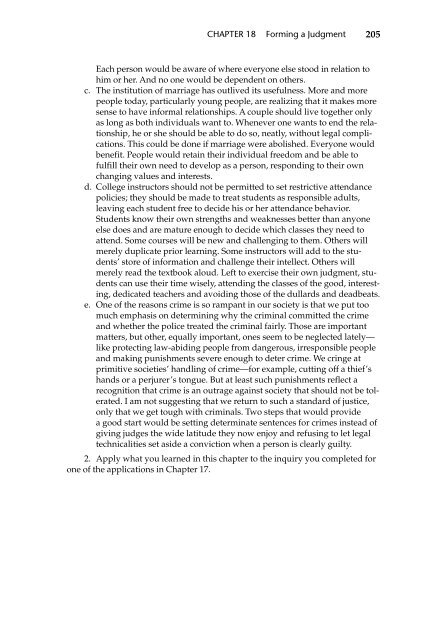Beyond Feelings
Beyond Feelings
Beyond Feelings
Create successful ePaper yourself
Turn your PDF publications into a flip-book with our unique Google optimized e-Paper software.
CHAPTER 18 Forming a Judgment<br />
205<br />
Each person would be aware of where everyone else stood in relation to<br />
him or her. And no one would be dependent on others.<br />
c. The institution of marriage has outlived its usefulness. More and more<br />
people today, particularly young people, are realizing that it makes more<br />
sense to have informal relationships. A couple should live together only<br />
as long as both individuals want to. Whenever one wants to end the relationship,<br />
he or she should be able to do so, neatly, without legal complications.<br />
This could be done if marriage were abolished. Everyone would<br />
benefit. People would retain their individual freedom and be able to<br />
fulfill their own need to develop as a person, responding to their own<br />
changing values and interests.<br />
d. College instructors should not be permitted to set restrictive attendance<br />
policies; they should be made to treat students as responsible adults,<br />
leaving each student free to decide his or her attendance behavior.<br />
Students know their own strengths and weaknesses better than anyone<br />
else does and are mature enough to decide which classes they need to<br />
attend. Some courses will be new and challenging to them. Others will<br />
merely duplicate prior learning. Some instructors will add to the students’<br />
store of information and challenge their intellect. Others will<br />
merely read the textbook aloud. Left to exercise their own judgment, students<br />
can use their time wisely, attending the classes of the good, interesting,<br />
dedicated teachers and avoiding those of the dullards and deadbeats.<br />
e. One of the reasons crime is so rampant in our society is that we put too<br />
much emphasis on determining why the criminal committed the crime<br />
and whether the police treated the criminal fairly. Those are important<br />
matters, but other, equally important, ones seem to be neglected lately—<br />
like protecting law-abiding people from dangerous, irresponsible people<br />
and making punishments severe enough to deter crime. We cringe at<br />
primitive societies’ handling of crime—for example, cutting off a thief’s<br />
hands or a perjurer’s tongue. But at least such punishments reflect a<br />
recognition that crime is an outrage against society that should not be tolerated.<br />
I am not suggesting that we return to such a standard of justice,<br />
only that we get tough with criminals. Two steps that would provide<br />
a good start would be setting determinate sentences for crimes instead of<br />
giving judges the wide latitude they now enjoy and refusing to let legal<br />
technicalities set aside a conviction when a person is clearly guilty.<br />
2. Apply what you learned in this chapter to the inquiry you completed for<br />
one of the applications in Chapter 17.


